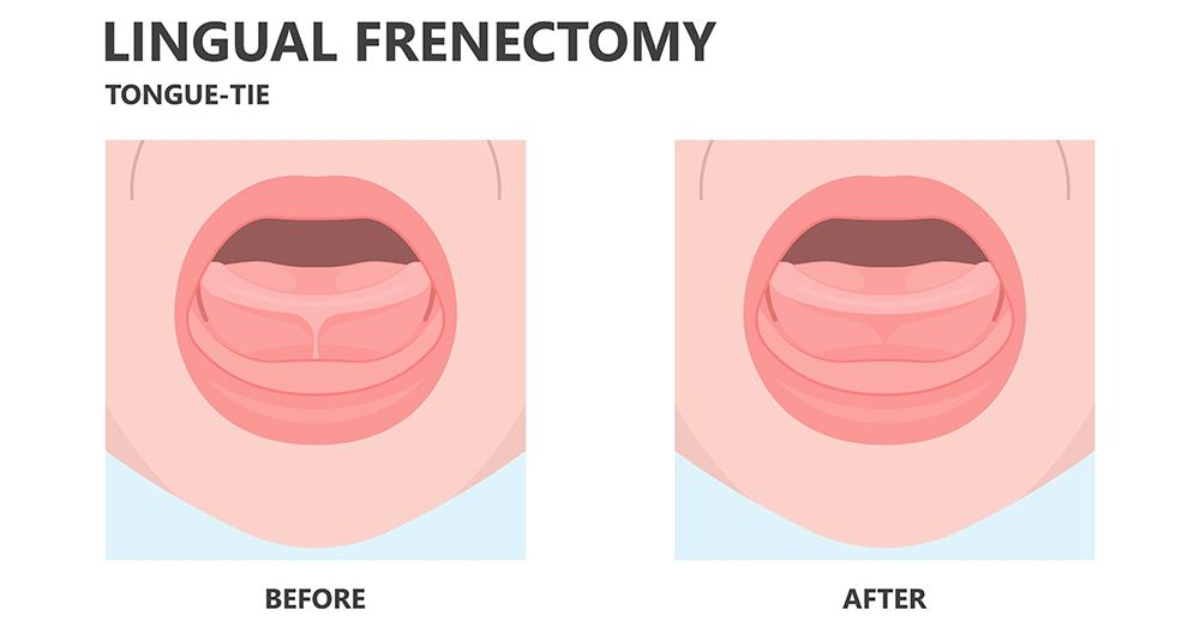Call Us Today 817-737-7668

Have you ever noticed how some people struggle with certain oral functions, like speaking, eating comfortably, or even brushing their teeth properly?
You may be surprised to learn that a small piece of tissue under the tongue or lip—known as the frenulum—can be the cause. A restricted or tight frenulum can affect more than just the way we speak. It can make it difficult to eat, drink, or maintain oral hygiene.
If you’ve noticed any of these issues, you’re not alone. Fortunately, there’s a simple procedure that can provide relief: the frenectomy.
A frenectomy improves oral function, speech, and eating. It is a quick and effective way to release the tension in the frenulum. Whether you’re dealing with a tongue-tie (ankyloglossia), lip-tie, or any other frenulum-related restriction, this procedure can help restore full movement.
In this blog, we’ll answer common questions about frenectomies and explain how they can enhance your quality of life. Read on to learn how this minor procedure can have a major impact!
What is a Frenectomy?
A frenectomy is a simple, quick procedure that involves removing or adjusting the frenulum, a small band of tissue that connects the tongue, lips, or gums. The frenulum can be found under the tongue (lingual) or between the upper lip and gums (labial). When this tissue is too tight or restrictive, it can cause various issues, such as difficulty speaking or eating.
There are two common types of frenectomies:
- Lingual Frenectomy: For issues with the tongue, like tongue-tie, which limits tongue movement.
- Labial Frenectomy: For issues with the upper lip, which can affect speech, eating, and oral hygiene.
In both cases, the goal of the procedure is to improve function and quality of life by releasing the restriction caused by a tight frenulum.
Why is a Frenectomy Necessary?
A frenectomy becomes necessary when the frenulum restricts proper movement of the tongue, lips, or gums. These restrictions can cause various problems, including:
- Speech Issues: A tight frenulum can make it difficult to pronounce certain sounds.
- Eating Problems: Limited movement affects chewing and swallowing.
- Oral Hygiene Problems: Difficulty brushing teeth effectively due to limited lip or tongue movement.
These problems can impact a person’s daily life, causing frustration and discomfort. A frenectomy improves oral function and helps one maintain oral health more easily.
How Does a Frenectomy Improve Speech?
When the frenulum is too tight, it can restrict tongue movement, leading to speech issues such as difficulty pronouncing certain words or sounds. This condition is known as tongue-tie or ankyloglossia. A frenectomy releases the restriction, allowing for better tongue mobility and clearer speech.
- Children and Adults Benefit: Whether you’re a child struggling with speech development or an adult with ongoing speech difficulties, a frenectomy can help.
- Improved Articulation: The procedure enhances speech patterns, making it easier to speak clearly.
- Better Communication: Clearer speech allows for more confident communication in social and professional settings.
Frenectomy’s Role in Enhancing Oral Function
A tight frenulum can limit the natural movement of the lips or tongue, which affects essential oral functions like chewing, swallowing, and cleaning teeth. For example, a restricted lip frenulum may make it harder to keep the lips sealed during brushing, while a tight tongue frenulum can make chewing and swallowing uncomfortable.
- Restores Full Movement: A frenectomy allows for a better range of motion in the lips and tongue.
- Improved Chewing and Swallowing: Easier food manipulation and less discomfort during meals.
- Effective Oral Hygiene: Full lip and tongue mobility make brushing and flossing more effective.
How a Frenectomy Affects Eating and Swallowing?
When the frenulum is restrictive, it can cause difficulty with eating and swallowing. This is especially true for infants who may have trouble breastfeeding due to tongue-tie or lip-tie. A frenectomy frees up the movement of the tongue or lip, allowing for more natural and efficient eating and swallowing.
- Improved Food Intake: A frenectomy enables better tongue and lip movement, improving the ability to chew and swallow food properly.
- Better Breastfeeding: Infants with tongue-tie can latch more effectively after the procedure.
- Reduced Discomfort: Less tension in the frenulum means less discomfort during meals.
The Procedure: What to Expect During a Frenectomy?
The frenectomy procedure is relatively quick and straightforward. Here’s what you can expect:
- Consultation: A periodontist will assess the frenulum and discuss your symptoms and treatment options.
- Anesthesia: Local anesthesia is used to numb the area, ensuring a pain-free experience.
- Procedure: The periodontist will carefully remove or adjust the frenulum using specialized tools.
- Recovery: Recovery is typically quick, with minimal downtime and a low risk of complications.
A frenectomy in Burleson, is an effective solution for those experiencing speech, eating, or oral function difficulties related to a restrictive frenulum.
When to Consider a Frenectomy: Signs You May Need One
If you’re experiencing challenges related to your frenulum, it might be time to consider a frenectomy. Look for these signs:
- Speech Difficulties: Struggling to pronounce certain sounds, like “t,” “d,” or “l.”
- Breastfeeding Trouble: Difficulty latching or prolonged feeding times for infants.
- Dental Hygiene Problems: Difficulty cleaning teeth or gums properly due to restricted lip or tongue movement.
A periodontist can evaluate whether a frenectomy is necessary based on these symptoms and recommend the best course of action.
The Benefits of Frenectomy for Long-Term Oral Health
With the growing number of kids born with ankyloglossia, the popularity of ankyloglossia surgery is also on the rise. A frenectomy offers several long-term benefits that can improve both speech and overall oral health:
- Improved Speech Clarity: Releasing the restriction can help restore clear articulation and better communication.
- Enhanced Oral Function: Full range of motion for chewing, swallowing, and brushing teeth.
- Prevention of Oral Issues: By improving function, a frenectomy can prevent further complications like gum recession or misalignment of teeth.
A frenectomy improves oral function and overall quality of life. By addressing issues like tongue-tie or lip-tie, it frees up movement, making everyday tasks like speaking, eating, and cleaning your teeth much easier. Whether you’re an infant facing breastfeeding challenges or an adult dealing with speech or oral function limitations, this simple procedure offers long-lasting benefits. If you’re experiencing any related issues, it might be time to explore how a frenectomy can make a real difference for you.





